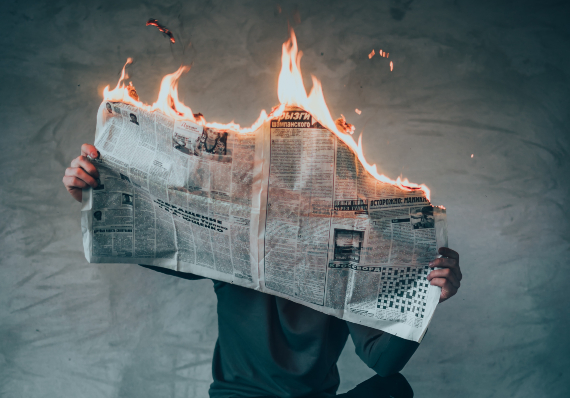The scandalous and pivotal issue arising out of the pandemic
During these days of uncertainty and fear, we have made the time to read too much, but never enough. Never enough because we have yet to receive a single explanation, a single message, that gives us a glimpse of a specific date — for as far in the future as it may be — that signals the end of this fear. Always too much because the knowledge and ideas that we have held as the most enlightened have swiftly crumbled without leaving even the slightest hint as to which direction events will take us, so that our preoccupations and theories of yesterday leave us with a strange aftertaste of banality. Within this strange concurrence of both a dearth and an overabundance of texts, it strikes me that there has hardly been mention of three pandemic-related events that might maintain a substantial inter-relationship.

First, reactions from religious quarters have remained in the background (and not only in those places where religious gatherings have not been allowed.) The same could be said, secondly, of commentary made by intellectuals who are normally pleased to publicly opine (at most, they have spoken — wearily protesting from the outside as if their personal experience encompasses the full history of the world — about how we are living in “strange times”). Lastly, but not least of all, the government has once again placed itself at the center of our lives: the government in the classic, sovereign sense of a perfectly delimited space, a government of which even its supporters, barely a few weeks ago, were saying that it was only “essential for the present moment,” a government whose intrusion into people’s’ private lives would have been difficult for the majority of citizens to tolerate just a short while ago.
The fact that for several weeks specialist authorities have not been able to give consistent diagnostic or therapeutic guidelines, and yet still have not lost public confidence, clearly demonstrates that in recent decades science has completely replaced religion as the superior authority. In view of the above and given that for now there is no conclusive narrative of the facts, intellectuals lack a point of reference on which to cling for their traditional practice of getting out in front of the camera to wage public debates with alternative versions and sceptical questions. After some initial vacillations, this twofold gap in knowledge has filled the state of emergency with barely distinguishable national variants that have assumed the guise of increasingly stringent codes of conduct, all of this with the consensus of such a wide spectrum of parties that it would have been hardly imaginable at the beginning of the year. A consensus that continues to push the few remaining skeptics to the sidelines of society, not to mention young people who, faced with the proximity of the abyss, embrace their emotions celebrating so-called “coronavirus parties.”

Could the state of emergency, which we have willingly embraced, become the state of our future? There is no room for doubting its most immediate, present legitimacy. In fact, the constitutions of most democratic societies (Switzerland is an exception in this respect) anticipate the possibility of transferring the law’s application directly to the executive power (meaning the government or administration) under extraordinary circumstances and during a limited timeframe, exempting it from the control of the legislative or judicial branches. In point of fact, it has been the left-wing liberal readers who have over and over again brought up the theories of the conservative philosopher, Carl Schmitt, who wanted to give the state (which during Schmitt’s era was Hitler’s state) control over the creation of law via its own actions. Certainly, the new political configuration is totally unrelated to this trend or its dangers.
In other words: there is no reason whatsoever to doubt the good will of our politicians to act truthfully in the service of the law and in the interests of the citizens they represent during the state of emergency. Still, clarifying what these specific interests are, whilst in the throes of the coronavirus crisis, is far from a simple task. We cannot talk about a real end to the pandemic until we know for certain the conditions that would end it (and we would not be talking about a mere reduction in the rate of contagion). Until then, the only goal must be to avoid a situation in which national health systems buckle under an overload of critical cases, a scenario in which not all patients could receive the same level of care in the fight for their survival. In short, it is about preserving a principle of equality that, specifically with respect to coronavirus, the most vulnerable patients will benefit, meaning men over 80 years old. Belonging to this group, I am in equal measure convinced and grateful that the great majority of my younger compatriots will want — at any price, really—to prevent a situation in which violating this principle of equality would be necessary (meaning, where younger people infected with coronavirus would be treated before patients of my generation.)
Nevertheless, intellectuals should attempt to make two observations before congratulating the government on its performance of declaring the state of emergency, or even before congratulating themselves for the wide social consensus that sustains their philanthropy. To begin with, this beautiful ideal of equality is entirely unusual from both a historical point of view and a recent once. Let’s remember: from the time civil armies were established in around 1800 through to the middle of the twentieth century, the deliberate decision to sacrifice a majority of the youngest male population for the sake of the power and honor of one’s nation was widely accepted by social consensus during extraordinary wartime circumstances. The fact that this is no longer the case could be considered to be great progress on the part of humanity, but this doesn’t mean to say that we should overlook the price of the ideal of equality.

So far, the primary mantras of resilience during the current state of emergencies (and in this respect, Donald Trump is no different from his European counterparts) have focused on providing repeated assurances, day after day, that there will not be a shortage of supplies and that the economy, both nationally and globally, will quickly recover from this mandated standstill. This optimism, however, is not built on a solid foundation, neither from a historical standpoint nor from economic science. The famous “Spanish influenza“, which took fifty million lives between the spring of 1918 and 1919 (almost three percent of the then world’s population and five times more victims than the world war that preceded it), was never fought via a worldwide paralysis of everyday life, mainly because of a lack of medical knowledge. This, in contrast to what is happening now, could explain why that pandemic came to an end relatively quickly and was forgotten with such manifestly staggering (or perhaps scandalous) speed.
The cost humanity might have to face in the future in exchange for preserving the principle of equality is something that is simply not known today. And this is where populist governments in a state of emergency (in a positive moral sense) are presented with a question that is scandalous and to a certain point painful and to which they should try to find an answer as quickly as possible: Is humankind’s survival being put at risk (or, at least, the youngest generations) with the decision to protect, equally and at any price, all citizens from the risk of death, by imposing draconian social-distancing measures? Certainly, it is possible that an effective pharmacological discovery could suddenly change the course of events or it could be that the virus “exhausts itself” just as they said with relief in Germany at the beginning of 1919. Still, while the possibility of a drastic future economic threat is not ruled out, the populism of governments in a state of emergency, secured by extensive support, involves a truly intolerable risk of which it will be impossible to demand accountability.
Given that the executive branches of governments represent the reaction of a clear majority of the population, transforming it into a code of conduct, the states of emergency will enjoy perfect political legitimacy, a legitimacy, however, that is not synonymous with the optimal fulfillment of its mission. This could only be achieved if certain topics critical to the future and with a scope that exceeds the general consensus, were to proliferate in the public debate, and to the extent possible an effort were made to identify responses that have yet to be resolved, in order to be able to later discuss the conclusions based on expert criteria. This is how the possibility of a critical, until now absolutely unusual, situation would come to be under consideration, a situation for which the goal would be to deliberately restrict the survival probabilities of the eldest generations in the interest of the future options of their youngest contemporaries.

Last week, the signals and voices that put into question the economic and global optimism surrounding survival multiplied indisputably. To what depths can stock market prices sink before making recovery impossible? Is the continuity of the world’s supply chain, as we have known it thus far (and which is not at all ideal) really guaranteed? It just might be that each day of the decreed standstill is not only a step closer to overcoming the pandemic, but also a step toward the end of humankind. For the record, this sentence does not advocate lifting the confinement measures that so rapidly spread around the world, which would not be at all realistic in view of the consensus reached, nor feasible, in terms of individual responsibility, without a reliable preview of the future.
Nevertheless, given the other environmental, demographic and economic threats that seem to be looming over humanity and which should now be accepted as a given, the state of emergency could indeed become the political model of the future (especially if it demonstrates its effectiveness during the coronavirus crisis.) In this case, it will be important to get used to the idea that a rigorous alignment with the will of the majority will not be enough to satisfy political demands. Responsible governing will depend more than ever on prudence and the willingness to confront the will of the majority, provided there are good reasons for doing so, with the divergent conclusions of experts. In this sense particularly, science has replaced religion.
Hans Ulrich Gumbrecht
Translation of the original text published in the newspaper Neue Zürcher Zeitung
Comments on this publication